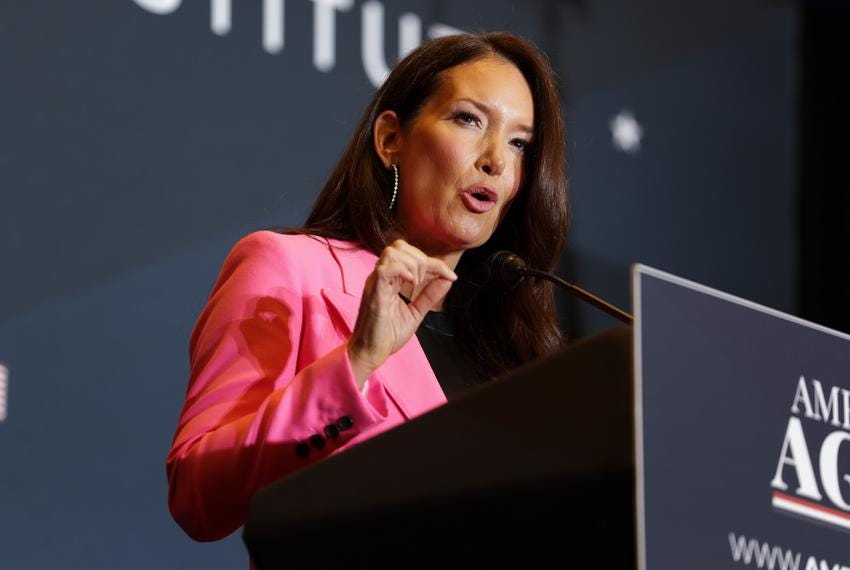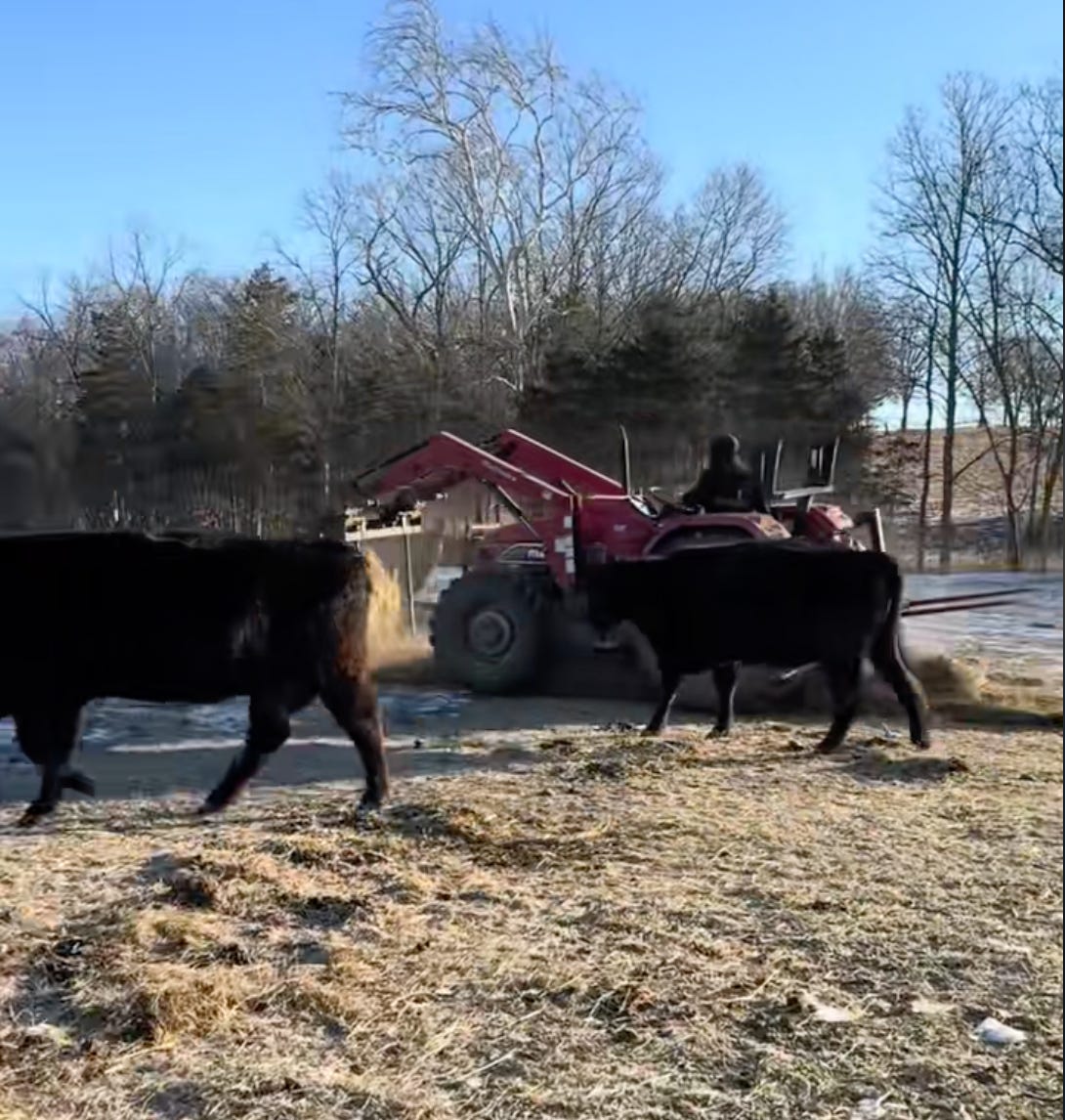The Government Promised to Pay -- Then it Didn't
Farmers are facing financial ruin after a funding freeze
by Ed Payne
When Skylar Holden signed up for the USDA’s EQIP program, he thought it made a lot of sense. The program provides technical and financial assistance to farmers to help them improve their production while conserving water and other natural resources.
The first-generation cattle producer in eastern Missouri liked it enough to sign a $240,000 contract with the agency’s Natural Resources Conservation Service to help pay for water lines on his farm. Everything was fine until late January when the Trump administration froze grants, loans, and assistance programs through executive orders.
In a TikTok video on Feb. 4 (which is no longer available), Holden said he laid out $80,000 from his budget to pay for the material and labor for water lines on his farm as part of the contract. Then, he got the bad news from the USDA.
“They called me… and said, hey, I know we have this signed contract. We’re reneging on it. We're not going to pay out on,” he said from the cab of his pickup.
“What do you mean you're not going to pay out on? So, I got all this stuff bought, and whenever I install it, you're not going to pay out? We had this contract. I made business decisions based on this contract.”
Holden is a Trump supporter, and he found little sympathy in the comments section. “Concepts of thoughts and prayers,” one message read.
Holden wasn’t alone in facing this issue. Farmers across the country reported similar news. Promised reimbursements were not coming.
For flower farmer Laura Beth Resnick, her USDA contract was supposed to pick up half the tab for a $72,000 solar panel installation. Her reimbursement was rejected in late January.
She told The Washington Post, “I really don’t know what we would do. It just feels like I can’t even really think about it.”
Paused or not paused?
This seemingly wasn’t supposed to happen. The Trump administration, in a release from the Office of Management and Budget (OMB), promised that “Funds for small businesses, farmers, Pell grants, Head Start, rental assistance, and other similar programs will not be paused” during the spending review imposed by the president’s executive orders.
But a Feb. 10 response from a USDA spokesperson told a different story. Everything, they said, was getting a once-over from the White House.
“The Trump Administration rightfully has asked for a comprehensive review of all contracts, work, and personnel across all federal agencies,” a USDA response emailed to The Preamble said.
“Anything that violates the President’s Executive Orders will be subject for review. The Department of Agriculture will be happy to provide a response to interested parties once Brooke Rollins is confirmed and has the opportunity to analyze these reviews.”
Rollins was confirmed as Secretary of Agriculture late last week. President Donald Trump signed the executive orders only hours after taking the oath of office on Jan. 20. On Jan. 31, a federal judge issued a temporary restraining order blocking the administration from freezing the funds.
But still, the funds weren’t released. The judge ruled on Feb. 10 that the White House was violating his order, and that the freeze, “has caused and continues to cause irreparable harm to a vast portion of this country.”
In a Feb. 6 letter to Washington, three Democratic members of Congress – Reps. Chellie Pingree, Angie Craig, and Sanford D. Bishop, Jr. – were looking for answers, too. They want to know why farmers weren’t getting the money promised in their contracts.
“We request USDA provide the rationale and legal justification for halting funding for these programs…Pulling the rug out from these recipients runs counter to the mission of the USDA and will quickly and significantly cripple economic development in rural America, with a ripple effect that hurts businesses and jobs that indirectly benefit from federal investment. Reneging on USDA’s funding commitments and arbitrarily stopping grant funding without consideration of the impacts to the hardworking American citizens is reckless.”
The National Sustainable Agriculture Coalition (NSAC) called the interruption of funds “unlawful” in a Feb. 7 release, suggesting the weeks-long freeze was “causing confusion and harm on farms and in communities nationwide.”
“During the past several weeks, we have heard directly from countless farmers and food system stakeholders who have been told, without explanation, that their grant or contract payments have been paused or that they cannot be reimbursed despite a signed lawful contract,” NSAC Policy Director Mike Lavender said ahead of the judge’s ruling. “Until USDA honors its commitments, farms and rural jobs will continue to be threatened, even lost.”
What’s next?
Farmers are used to dealing with uncertainty, but the new administration’s freeze on loans, grants and assistance is adding a new layer to their concerns.
In testimony to the Senate Agriculture Committee on Feb. 5, National Farmers Union President Rob Larew asked senators to consider what’s fair, especially for American family farmers.
He said: “Congress should focus on expanding domestic and global markets, holding trade partners accountable and ensuring that trade policies are applied carefully to protect – not harm – American farmers and ranchers.
“Finally, recent executive actions are creating concern for farmers and communities—no one knows what funding will be available, or if key programs will have the staff needed to get funds out the door. Freezing spending and making sweeping decisions without congressional oversight just adds more uncertainty to an already tough farm economy.
“We encourage this committee to seek clarity from the administration and make sure farmers and rural communities aren’t left behind.”
Robbing Peter to pay Paul
Back in Missouri, the pressure is on Holden as he stares at tens of thousands of dollars in bills, unsure of how he’ll pay them. He’s used to juggling the books, but this time it’s different.
“Now I have $80,000 out of my pocket that I didn't have to spend,” he said in frustration. “So, the $80,000 that we have is supposed to go to our farm loan in the fall. If we don't have that money, that's our hay money. That's our farm payment money. If we don't have that money, we will lose this farm.”
If the money doesn’t come from the USDA contract, the dominoes will start to fall.
“The only way that I can think to get around it is we sell some cows,” Holden said. But it’s only a short-term solution with long-term consequences.
“And if I sell cows now to make that payment, I'm not going to make the payment in the fall [on the farm loan], because the cows are calculated in my payment in the fall. So, because I got in bed with the government, I spent money based on a contract that we signed – they're reneging on it – I'm just screwed.”
Holden said he reached out to Ann Wagner, his U.S. representative for the second district of Missouri, looking for help. The USDA suggested contacting her office when they informed Holden they wouldn’t be paying out on the contract.
“I'm hoping that something comes out of that, but I don't have very high hopes of it,” he said. “Hopefully it's just a temporary ban on payment of that. But I don't understand how you can sign a contract and then just renege on that contract. I do not understand that at all if something doesn't change, we are going to lose this farm and I am extremely stressed about it.”
While legal battles and political debates play out in Washington and in the courts, the reality is far more immediate – contracts were signed, money was spent, and livelihoods are at risk.
Whether the Trump White House fully complies with the court order or continues to delay, one thing is clear: trust in government programs has been shaken, and for many farmers, the damage may be harder to repair than their budgets.







*sigh* Trump has a LOOOOOONG and well-documented history of breaking contracts and failing to pay. His administration is full of criminals, adulterers, abusers, alcoholics, and drug addicts who largely have no relevant experience doing what they have been tasked to do. None of this should be surprising, but people like this poor farmer were sucked into a cult of grievance, and here we are.
As always, excellent reporting.
This is infuriating. What’s interesting to me though is the phrase he used: “I got into bed with the government”. You can still hear the disdain for government that’s been instilled in him as a Trump supporter. But it wasn’t the (traditional) government that failed him or was a risk here, it was Trump himself. I think it’s a small, interesting example of the internal thought process that Trumps followers will probably use overtime to justify his actions.